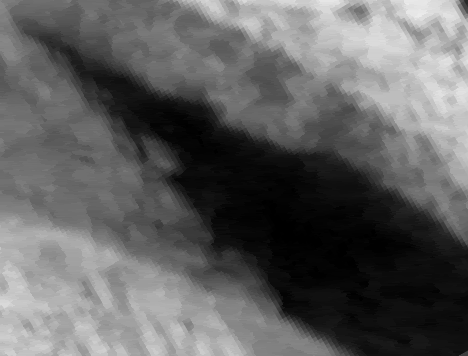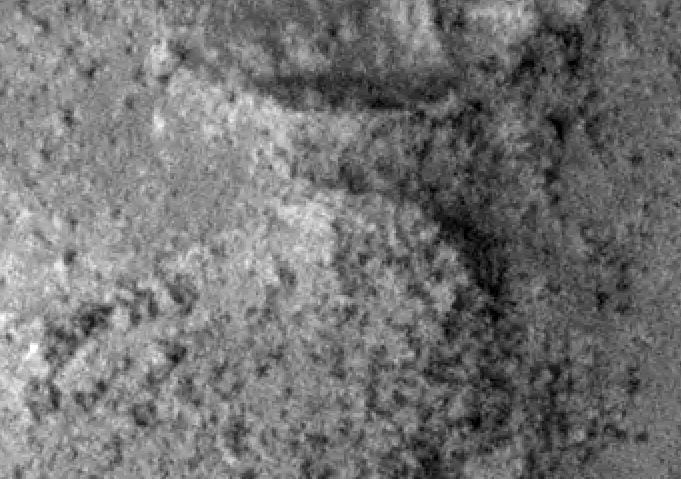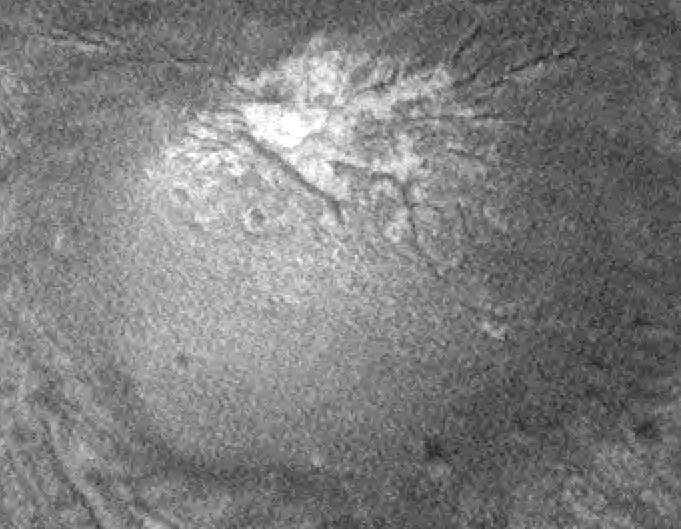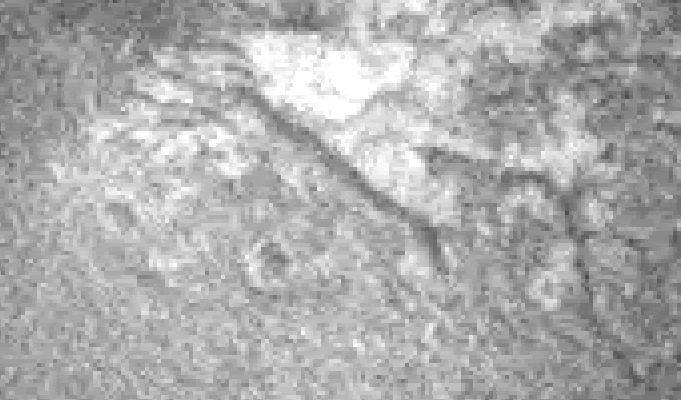- Thank you received: 0
Domes in Plains South of Ius Chasma
16 years 11 months ago #20726
by Joe
Reply from was created by Joe
Please Log in or Create an account to join the conversation.
16 years 11 months ago #20889
by rderosa
Replied by rderosa on topic Reply from Richard DeRosa
I think some people are operating on a slight misconception regarding some of the HiRise images. Remember, these are not the old MOC images that had roughly 5m/pixel resolution. For the MOC images, everyone was justified in saying that "if only we could see them a little better, we might be able to tell if it's what we think it is."
With the HiRise, it's a whole different story. The pixel resolution is 25cm/pixel. If we assume it takes 5 pixels to resolve something, that means we're actually "seeing" objects about the size of a wheelbarrel, or roughly 50 inches.
What that means is that if we are looking at an object that is approx. 45 meters, we're seeing it pretty much for what it is. The idea that "if we could see it better..." doesn't carry nearly the same weight as it did with the MOC.
In practical terms, what that means is that if something looks like a 45 meter blob of some unknown material, that's probably what it is. If it was a 45 meter dome, we'd see it. That would represent something about the size of a little league baseball stadium, and would be easily recognized as such. We might even see some bats lying around by home plate, although the bases themselves might be a little hard to make out.
[added note: There's one caveat, though. If Trinket is right, and NASA is purposely blurring the images, then maybe what I just said wouldn't hold true.]
rd
With the HiRise, it's a whole different story. The pixel resolution is 25cm/pixel. If we assume it takes 5 pixels to resolve something, that means we're actually "seeing" objects about the size of a wheelbarrel, or roughly 50 inches.
What that means is that if we are looking at an object that is approx. 45 meters, we're seeing it pretty much for what it is. The idea that "if we could see it better..." doesn't carry nearly the same weight as it did with the MOC.
In practical terms, what that means is that if something looks like a 45 meter blob of some unknown material, that's probably what it is. If it was a 45 meter dome, we'd see it. That would represent something about the size of a little league baseball stadium, and would be easily recognized as such. We might even see some bats lying around by home plate, although the bases themselves might be a little hard to make out.
[added note: There's one caveat, though. If Trinket is right, and NASA is purposely blurring the images, then maybe what I just said wouldn't hold true.]
rd
Please Log in or Create an account to join the conversation.
16 years 11 months ago #19867
by Joe
Replied by Joe on topic Reply from
Please Log in or Create an account to join the conversation.
16 years 11 months ago #19868
by Joe
Replied by Joe on topic Reply from
Please Log in or Create an account to join the conversation.
- neilderosa
-
- Offline
- Platinum Member
-

Less
More
- Thank you received: 0
16 years 10 months ago #19873
by neilderosa
Replied by neilderosa on topic Reply from Neil DeRosa
<blockquote id="quote"><font size="2" face="Verdana, Arial, Helvetica" id="quote">quote:<hr height="1" noshade id="quote"><i>Originally posted by rderosa</i>
<br />I think some people are operating on a slight misconception regarding some of the HiRise images. Remember, these are not the old MOC images that had roughly 5m/pixel resolution. For the MOC images, everyone was justified in saying that "if only we could see them a little better, we might be able to tell if it's what we think it is."
With the HiRise, it's a whole different story. The pixel resolution is 25cm/pixel. If we assume it takes 5 pixels to resolve something, that means we're actually "seeing" objects about the size of a wheelbarrel, or roughly 50 inches.
What that means is that if we are looking at an object that is approx. 45 meters, we're seeing it pretty much for what it is. The idea that "if we could see it better..." doesn't carry nearly the same weight as it did with the MOC.
In practical terms, what that means is that if something looks like a 45 meter blob of some unknown material, that's probably what it is. If it was a 45 meter dome, we'd see it. That would represent something about the size of a little league baseball stadium, and would be easily recognized as such. We might even see some bats lying around by home plate, although the bases themselves might be a little hard to make out.
[added note: There's one caveat, though. If Trinket is right, and NASA is purposely blurring the images, then maybe what I just said wouldn't hold true.]
rd
<hr height="1" noshade id="quote"></blockquote id="quote"></font id="quote">
One possibility might be that the IAS viewer is not quite as good as "full resolution."
Anyway, here's a comparison of four images magnified to the point where you can see the pixels. That would theoretically mean that if you counted 4 pixels on what looks like a rock, then the rock is one meter across. It seems that there is indeed a difference between "Cydonia's Eye," "Wil's Eye," and Joe's "dome" in the clarity of the image, but whether it's purposeful I have no idea.
3896 1740 WIL'S EYE
3234 2210 CYDONIA'S EYE
JOE'S DOME 1
JOE'S DOME 2
<br />I think some people are operating on a slight misconception regarding some of the HiRise images. Remember, these are not the old MOC images that had roughly 5m/pixel resolution. For the MOC images, everyone was justified in saying that "if only we could see them a little better, we might be able to tell if it's what we think it is."
With the HiRise, it's a whole different story. The pixel resolution is 25cm/pixel. If we assume it takes 5 pixels to resolve something, that means we're actually "seeing" objects about the size of a wheelbarrel, or roughly 50 inches.
What that means is that if we are looking at an object that is approx. 45 meters, we're seeing it pretty much for what it is. The idea that "if we could see it better..." doesn't carry nearly the same weight as it did with the MOC.
In practical terms, what that means is that if something looks like a 45 meter blob of some unknown material, that's probably what it is. If it was a 45 meter dome, we'd see it. That would represent something about the size of a little league baseball stadium, and would be easily recognized as such. We might even see some bats lying around by home plate, although the bases themselves might be a little hard to make out.
[added note: There's one caveat, though. If Trinket is right, and NASA is purposely blurring the images, then maybe what I just said wouldn't hold true.]
rd
<hr height="1" noshade id="quote"></blockquote id="quote"></font id="quote">
One possibility might be that the IAS viewer is not quite as good as "full resolution."
Anyway, here's a comparison of four images magnified to the point where you can see the pixels. That would theoretically mean that if you counted 4 pixels on what looks like a rock, then the rock is one meter across. It seems that there is indeed a difference between "Cydonia's Eye," "Wil's Eye," and Joe's "dome" in the clarity of the image, but whether it's purposeful I have no idea.
3896 1740 WIL'S EYE
3234 2210 CYDONIA'S EYE
JOE'S DOME 1
JOE'S DOME 2
Please Log in or Create an account to join the conversation.
16 years 10 months ago #20732
by rderosa
Replied by rderosa on topic Reply from Richard DeRosa
<blockquote id="quote"><font size="2" face="Verdana, Arial, Helvetica" id="quote">quote:<hr height="1" noshade id="quote"><i>Originally posted by neilderosa</i>
<br />One possibility might be that the IAS viewer is not quite as good as "full resolution."<hr height="1" noshade id="quote"></blockquote id="quote"></font id="quote">That's possible, but if you think about it, that would be pretty silly of them. Think about the progression of the utility for a second:
1. First they started to post the new High Resolution images, but the images were so big (byte-wise) that they were crashing everybody's Paint software. Users all over the world (and I was one of them) were calling them, telling about how useless all these big files were, but that we were excited about seeing the new high resolution images if they could somehow fix the problem.
2. Next, they make a decision that they're going to fix the problem. As a matter of fact, they were highly motivated to fix the problem. The solution? Make a viewer that can load the big files quickly. Plus, add a utility that allows the end user to save a "screen view". Now presumably, they would mean here that they save a "screen view" at the current high resolution at the time. In other words, the Viewer's whole purpose has to be to retain the original resolution, while allowing the user to take small pieces out of it to save on his harddrive to use in his Paint software.
It would be the height of insanity to make the Viewer such that the end product would end up having the old MOC resolutions. Man, I can't believe they could possibly do something like that, (although nothing really surprises me anymore). But, I have to believe that their goal was to retain resolution in the Viewer of the full downloaded image.
Only problem though is that I can't prove it, because if I download the whole 177MB file, and try to open it in my Paint software, I get the same error I got a year ago when I last tried it, and I'm not inclined to spend any time trying to figure out why.
But in my opinion, an ambitious Artificiality Advocate would pursue this line of thinking to prove one way or the other whether or not we're seeing what we should be seeing, and maybe contact them again with the results.
rd
<br />One possibility might be that the IAS viewer is not quite as good as "full resolution."<hr height="1" noshade id="quote"></blockquote id="quote"></font id="quote">That's possible, but if you think about it, that would be pretty silly of them. Think about the progression of the utility for a second:
1. First they started to post the new High Resolution images, but the images were so big (byte-wise) that they were crashing everybody's Paint software. Users all over the world (and I was one of them) were calling them, telling about how useless all these big files were, but that we were excited about seeing the new high resolution images if they could somehow fix the problem.
2. Next, they make a decision that they're going to fix the problem. As a matter of fact, they were highly motivated to fix the problem. The solution? Make a viewer that can load the big files quickly. Plus, add a utility that allows the end user to save a "screen view". Now presumably, they would mean here that they save a "screen view" at the current high resolution at the time. In other words, the Viewer's whole purpose has to be to retain the original resolution, while allowing the user to take small pieces out of it to save on his harddrive to use in his Paint software.
It would be the height of insanity to make the Viewer such that the end product would end up having the old MOC resolutions. Man, I can't believe they could possibly do something like that, (although nothing really surprises me anymore). But, I have to believe that their goal was to retain resolution in the Viewer of the full downloaded image.
Only problem though is that I can't prove it, because if I download the whole 177MB file, and try to open it in my Paint software, I get the same error I got a year ago when I last tried it, and I'm not inclined to spend any time trying to figure out why.
But in my opinion, an ambitious Artificiality Advocate would pursue this line of thinking to prove one way or the other whether or not we're seeing what we should be seeing, and maybe contact them again with the results.
rd
Please Log in or Create an account to join the conversation.
Time to create page: 0.318 seconds











